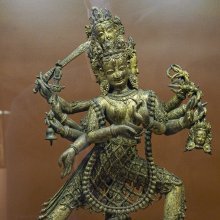Siddhilakshmi, Siddhilakṣmī, Siddhi-lakshmi: 1 definition
Introduction:
Siddhilakshmi means something in Hinduism, Sanskrit. If you want to know the exact meaning, history, etymology or English translation of this term then check out the descriptions on this page. Add your comment or reference to a book if you want to contribute to this summary article.
The Sanskrit term Siddhilakṣmī can be transliterated into English as Siddhilaksmi or Siddhilakshmi, using the IAST transliteration scheme (?).
Images (photo gallery)
In Hinduism
Shaktism (Shakta philosophy)
Source: Google Books: ManthanabhairavatantramSiddhilakṣmī (सिद्धिलक्ष्मी) or Siddhalakṣmī is the Goddess associated with Uttarāmnāya, according to Mukundarāja’s Saṃvartārthaprakāśa.—[...] Only the northern, western and upper āmnāyas are extensively functional amongst the Newars, in theory, like other Kaulas, they follow a system of six āmnāyas. This is largely based on the Parātantra. Thus, those listed in the Saṃvartārthaprakāśa by Mukundarāja, who was a Newar, agree with that source. The goddesses in the six āmnāyas are: [...] Mukundarāja adds two more goddesses related to the āmnāyas who are very important for the Newars. One is Siddhilakṣmī (sic. Siddhalakṣmī). She belongs to the Uttarāmnāya. The other is Ugracaṇḍā (= Maheśāsuramardinī / Durgā) who belongs to the Dakṣiṇāmnāya.

Shakta (शाक्त, śākta) or Shaktism (śāktism) represents a tradition of Hinduism where the Goddess (Devi) is revered and worshipped. Shakta literature includes a range of scriptures, including various Agamas and Tantras, although its roots may be traced back to the Vedas.
See also (Relevant definitions)
Partial matches: Lakshmi, Siddhi.
Full-text: Siddhalakshmi, Ugracanda.
Relevant text
Search found 2 books and stories containing Siddhilakshmi, Siddhilakṣmī, Siddhi-lakṣmī, Siddhi-lakshmi, Siddhilaksmi, Siddhi-laksmi; (plurals include: Siddhilakshmis, Siddhilakṣmīs, lakṣmīs, lakshmis, Siddhilaksmis, laksmis). You can also click to the full overview containing English textual excerpts. Below are direct links for the most relevant articles:
Varahi Tantra (English Study) (by Roberta Pamio)
Chapter 15 - The worship of Siddhilakṣmī < [Summary of the Vārāhī Tantra]
Brief outline of the Vārāhī Tantra
Chapter 25 - The seventeen-syllabled Mantra < [Summary of the Vārāhī Tantra]
Lalitopakhyana (Lalita Mahatmya) (by G.V. Tagare)
Related products
